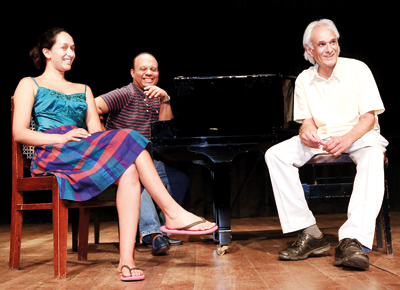Mutual respect and beauty of chamber music

At the Wendt on Monday, L-R: Mandhira de Saram, Rohan De Silva and Rohan de Saram. Pic by Priyantha Wickramaarachchi
For those unfamiliar with the classical music scene, this classical trio could perhaps be described as of particular eminence. British-born Rohan de Saram, is one of Sri Lanka’s best known musicians, having been described as “a Cello Phenomenon, one of the greatest cellists of our time” by the German newspaper Kolnische Rundshau, and a “rare genius and born musician” by Greek conductor Dmitri Mitropoulos. Equally famous is Juilliard graduate, pianist Rohan De Silva, whose illustrious career in the U.S. has seen him perform twice at the White House for the visits of Queen Elizabeth and the then Israeli President Shimon Peres. And last but not least, young Mandhira de Saram, daughter of the famous Druvi de Saram and niece of Rohan de Saram, an up and coming musician, and leader of the much praised British string ensemble, ‘The Ligeti Quartet’.
Last Tuesday (March 27), the Sunera Foundation presented “A Classical Trio” – at the Lionel Wendt Theatre with the three musicians performing in aid of the Foundation, a cause they have supported over the years. The Foundation founded by Sunethra Bandaranaike in 2000 works with disabled individuals, using performance art as a tool to help them integrate into society.
The Sunday Times caught up with the musicians after a pre-concert practice at the Wendt. For Rohan De Silva, the foundation’s cause is one that is close to his heart, as his friend, the violin virtuoso Itzhak Perlman, whom he has a close musical partnership with, suffers from polio. Mandhira echoes these sentiments having worked with differently abled people. “I love the idea of using the arts to rehabilitate people,” she says, adding that the shows put on by the foundation are truly wonderful.
All three have been involved with Sunera before, with each performing at its fund raising concerts, in fact the two Rohans have performed together back in 2008 for the Sunera Foundation. But this concert marks the first time that all three musicians will be performing together. The short rehearsal time, seems not to be an issue. This is because everyone is familiar with each other’s ideas, explains Mandhira. “When the idea is good, you have to let it speak. Then half the battle is won,” adds De Silva, noting that mutual respect is important.
They explain that the beauty of chamber music -which they would be performing- is its intimacy. Though played as a group, the setting is such that each one’s personality shines through. “It’s not putting in but rather taking out (from the music),”says de Saram, quoting the great Thomas Beecham, adding that they’re just channels for the music to flow through.
Playing in Sri Lanka is significant for them as De Silva puts it, because it’s their home, one where they spent their formative years. Sri Lankan artistes of the western music tradition, especially young artistes should have more support. “There’s so much talent. They’re just not nurtured enough,” he says. But there is definitely interest when concerts of this calibre take place, as Mandhira notes the enthusiasm surrounding their concert.
“Art has two sides, the producing and the receiving side,” says de Saram. The eastern music tradition, he explains is very much like the western music tradition in Europe during the classical music eras, with music being seen as a lifestyle and craft that was handed over from one generation to another. But most importantly they both depended on patronage from the upper echelons of society. This, he explains, is the receiving side supporting the producing side of art. Likewise he explains that for western classical music to develop in Sri Lanka there must be enthusiasm and patronage from audiences. By having concerts of this nature, with artistes of this calibre a culture and love for classical music can be fostered and developed in the island which will in turn lead to greater development of our local musicians.
Hopefully concerts of this nature will inspire young musicians, possibly making Sri Lanka a cultural hub for western music in the region.


